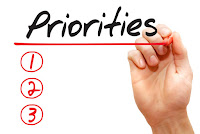We’re
getting close to that time of year when we reflect back and look forward, and
this can be a good time for helping teachers prioritize their activities and
routines. Here’s an exercise suggested
by Shawna Coppola* that works well when coaching individual teachers or teams.
First,
ask teachers to choose which part of the day or content area they want to reconsider
(if their secondary teachers, you can skip this step!). Next, make a list of everything that could
potentially happen (or that the teacher(s) did this year), during that part of
the day. Don’t get too specific; the
idea is to list generalizable, repeated activities. For example, don’t list “Read aloud of James and the Giant Peach,” list “Teacher
read aloud,” or maybe “Teacher read aloud while students draw the scene.” Keep
going until you run out of steam (or chart paper, whichever comes first!). Hint: If you’re working with just one
teacher, the list can be made on a piece of paper. Or, go tech for this activity and create the
list digitally, projecting if you’re working with a group.
Next,
add another column to your list. Across
from each activity listed, put the purpose of the activity. There may be several. For example, with a teacher read aloud, some
purposes might include: modeling fluency, building vocabulary, practice
visualizing.
Now
it’s time to look for overlaps in this second column. Do students have lots of opportunities for building
vocabulary but not much time spent practicing skills independently? Based on
prevalence of skills, teachers can prioritize their learning activities,
potentially eliminating some and making their pedagogical plate leaner and
cleaner.
As
an end-of-year reflection, this activity gives teachers a time to focus their
thinking over the summer on the activities at the top of their priorities
list. If used as a back-to-school
activity, it might help teachers feel less overwhelmed and more purposeful if
they lighten their load.
p.s. You might try this activity yourself with
your myriad coaching duties!
*Find Shawna at: http://blog.stenhouse.com/archives/2018/03/30/mentoring-new-teachers-podcast-episode-ii-social-emotional-learning/
This week, you might want to
take a look at:
Pop
songs for end-of-the-year reflection (I plan to use some for teacher reflection
as well):
Encouraging
an appreciative attitude in the classroom:
Ask, “What makes you angry?” to involve
students in civic engagement:
How
should we assess things that matter?
Big
ideas for increasing engagement:
That’s it for this week. Happy Coaching!
Was this helpful? Please share!
Want to know about new posts? Click
“Follow” (bottom right)



